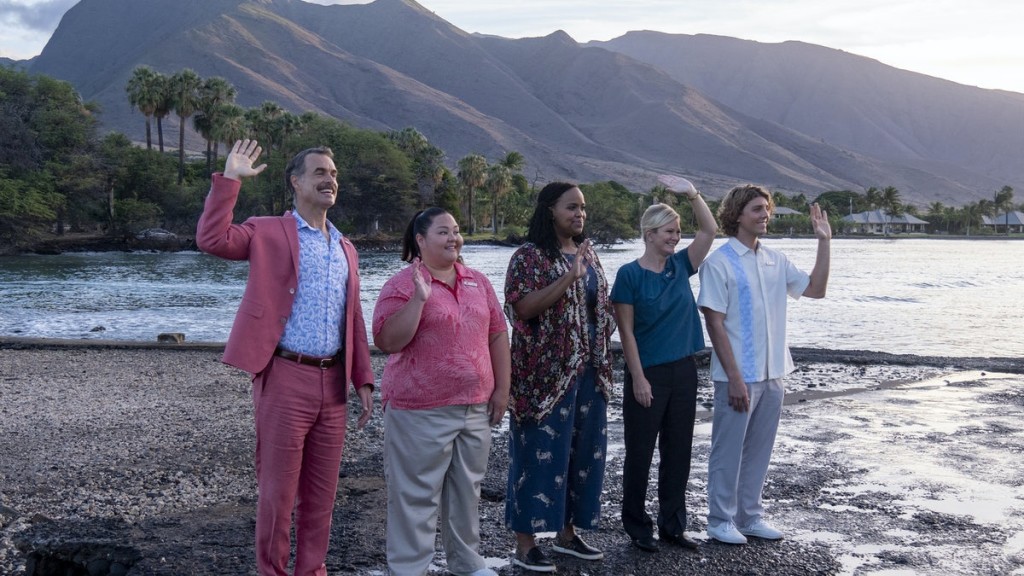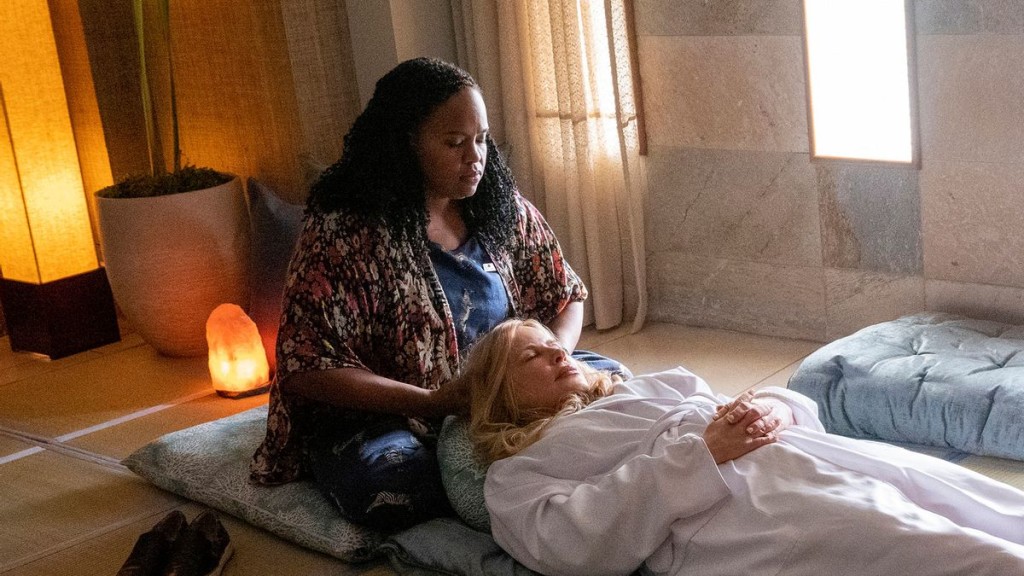How is it that one person can like a show this much? That he would dedicate an entire week of articles to it? It is a mystery that Scriptshadow readers will be trying to solve for years. However, for those of you who love White Lotus as much as I do, continue with me on this journey as we enjoy the many fruits that have been birthed from our beloved show’s bosom.
Today, we focus on theme and how it affects character. For those of you who have been with me for a while, you know I’m not a “theme” guy. I’ve heard from just as many writers who say theme emerges organically for them as I have those who say you have to commit to a theme up front. It’s ultimately up to the writer.
But Mike White has me reevaluating my stance. Because one of the reasons these characters are so good is because he constructs them through the lens of theme.
Now I don’t know what the exact theme of White Lotus is. I just know, from White’s interviews, that the primary focus for him was exploring the intersection between the rich and the poor during a week at an expensive island resort.
Some writers believe theme should be conveyed through a sort of “mission statement.” Something like, “Money defines humanity in one of two ways – either you are the hunter or the hunted.” The story, then, sets out to prove or disprove that premise.
I don’t think that’s how Mike White approached this. I think he just wanted to explore wealth (or lack of wealth) and how it defines people and creates the relationships between them. Feel free to offer a different opinion in the comments.
Just to be clear, the premise behind this week’s series of articles is the amazing characters Mike White created. I want to know how he achieved this, especially in such a short amount of time. And as I rewatch the series, I realize that approaching character through theme is a very powerful way to create characters.
Every time we put pencil to paper – when we’re about to write that character name for the first time – we’re making a choice about who we’re bringing into this world. This character is going to have some sort of affect on our story. If it’s a major character, they’ll have a large impact on the story. If they’re a secondary character, they’ll have a smaller imprint. Generally, we create these characters based on instinct. We go with what “feels” right.
So if we’re writing an action movie and we’re trying to figure out who our main character should be, we may think to ourselves, “I want somebody big and burly who’s had a rough life and only uses violence as a last resort.” That becomes the baseline for our character and we build him from there.
What theme does is it provides us a clearer framework from which to construct our character. In Mike White’s case, his theme is the intersection between the wealthy and the poor (or ‘working class’) via an expensive resort. So whenever White is creating a character in White Lotus, all he has to do is decide, ‘how can I create a character that best explores that theme?’
Take Paula, for example. If you remember, Paula is the mixed-ethnicity friend of Olivia, who invited her on the trip. Now let’s really get into this because you have to understand the breadth of options one has before they put a character on the page. White could’ve made Paula ANYBODY. He could’ve made her a drop-dead gorgeous stunner who Olivia is jealous of. He could’ve made her an Olivia clone who also comes from a wealthy family. He could’ve made her the comic relief. Hell, he could’ve made her transgender.
But none of those options would’ve helped explore his theme. Paula comes from a lower-income family, which helps make Olivia look good. Here she is with her little charity case friend who gives her the street cred of not choosing her friends through the lens of privilege, but rather through the content of their character (or so she wants others to believe).
It also leads to the storyline of Paula trying to help out a poor islander who works at the resort. Paula understands his struggle because she, likewise, grew up in a family that struggled. And so she creates this opportunity for him to steal 80 thousand dollars from Olivia’s family. All of this is happening because White is exploring his theme. And he’s able to explore that theme because he constructed the character of Paula through that thematic lens.
Probably the most interesting exploration of the theme occurs with the character of Belinda. Belinda is an African-American masseuse at the resort. Her storyline begins when oddball socialite, Tanya, comes by for a massage and Belinda gives her this spiritual massage that rocks Tanya’s world. She’s never felt more at peace and relaxed as she does after this massage. She’s so taken by the experience that she invites Belinda to dinner and wants to book her every day of the week.
At dinner, she says, dude, you need to leave this place and start your own practice. I would fund it. Belinda later talks to her son who says, “This has always been your dream, mom. You need to do everything in your power to make this happen.” So Belinda starts pursuing Tanya and talking about what the practice could be. But Tanya starts to cool on the idea and we can feel Belinda getting desperate as she realizes that Tanya may have changed her mind.
Once again, Mike White could’ve set Tanya up with anyone as her main relationship on the show. You could’ve had her befriend another rich socialite or one of the families there. She could’ve hung out at the bar every night looking for men. But none of those scenarios would’ve explored the theme. White wanted a relationship that specifically dealt with the theme of money. That’s how Belinda’s character was born. She was constructed to be poor and get this taste – just a little taste – of what wealth and success might look like in her life, only to have it ripped away from her by the end of the week. It’s heartbreaking. And, for the purposes of the show, it perfectly explores the theme.
Another example is Rachel. Rachel, if you remember, is the gorgeous wife of Shane, the guy who becomes obsessed with getting them the best suite in the hotel. When Mike White was constructing Rachel, he was obviously doing so with the idea of wealth in mind. Giving Shane a hot Instagram-obsessed ditz of a wife may have provided some funny situations. But where is the exploration of theme in that? Instead, Rachel comes from a very poor family. And so this world that she’s been invited into is totally alien to her.
It also becomes a huge point of contention in Shane’s pursuit of getting the best room in the hotel. To Rachel, this room is beautiful. There is zero reason to complicate their honeymoon just because it’s a little less nice than another room. But to someone like Shane who has grown up surrounded by wealth, getting the “best” room in a hotel is a source of pride, a scalp he can brag about to his rich friends. To him, only second tier citizens settle for lesser rooms. It’s probably the most aggressive look into how wealth shapes people than anything else in the story.
A couple of final thoughts here. I believe theme, as it relates to character, is more important for TV than movies. Because, as we can see in TV shows, scenes are much more character-based. It’s usually about two characters engaging in some sort of conflict-related issue, either on the surface or beneath it. So a strong theme can really help shape these scenes.
Finally, a theme that explores the difference between the rich and the poor is one of the easier themes to explore because of how easy it is to show. It’s easy to convey characters who are either rich or poor. I guess what I’m saying is, using theme as a way to construct character sounds easy in practice. But if you were exploring the theme of, say, “living a life of balance,” it’s not going to be as easy to pull off. So make sure if you’re adapting this approach to do so with a theme that you can actually show.
‘White Lotus is Brilliant Week’ continues tomorrow!



